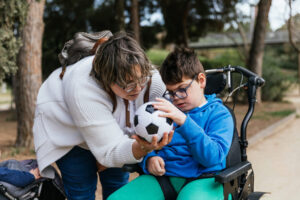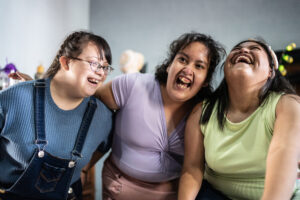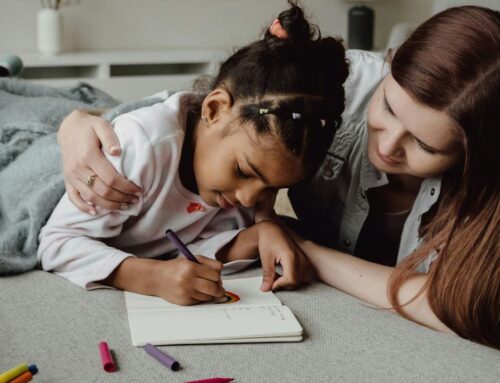At SelfDesign, we believe learning should be as unique as each child. Our entire approach is built around personalized learning—recognizing that every learner has their own way of seeing, understanding and engaging with the world. This makes SelfDesign a welcoming space for learners with disabilities or diverse abilities who may not thrive in traditional education environments.
Everyone’s voice matters when it comes to learning

We see parents and families as experts in their children’s lives. That’s why parents and caregivers are essential members of each learner’s support team at SelfDesign. Together with certified educators and professional support providers, families co-create a personalized education plan that reflects each learner’s strengths, challenges and goals.
At SelfDesign, we also honour the many ways learners communicate and express themselves. We take time to understand each learner’s needs and design flexible pathways to help them thrive—academically, emotionally and socially.
Who can benefit from SelfDesign’s support services?
Support services are available for full-time enrolled learners who qualify under the BC Ministry of Education’s criteria for low- or high-incidence special needs.
Low-incidence needs may include:
-
- Autism Spectrum Disorder
- Deaf or hard of hearing
- Blind or visually impaired
- Intellectual or physical disabilities (moderate to profound)
- Medically fragile conditions
- Severe mental illness or behavioural challenges
High-incidence needs can include:
-
- Learning disabilities
- ADHD or anxiety
- Mild intellectual disabilities
- Speech or language impairments
We recognize that the path to success for learners with diverse abilities must involve a personalized approach and strong support. Whether a learner has a formal diagnosis or is just beginning to explore what supports might help them succeed, we’re here to meet them where they are.
“Just getting my son up in the morning is ten times more difficult than a child without special needs. He has massive meltdowns over and over. Flexibility is the key thing I really like about SelfDesign. Having the ability to tailor Marcus’s education based on what we need and where we are is so important.” – SelfDesign Parent
Learners, families and educators collaborate to design an Individual Education Plan (IEP)

Personalized support is founded on teamwork. Every learner who qualifies for Support Services receives an Individual Education Plan or IEP—a customized plan developed collaboratively by educators, the family and the learner. Depending on a learner’s needs, this plan may also involve additional specialists such as:
-
- Speech-language pathologists
- Occupational therapists
- Mental health counsellors
- Behaviour interventionists
Educators check in weekly, review progress, offer learning suggestions, and connect families with appropriate supports. Support providers—contracted and paid for by SelfDesign—are carefully selected in partnership with families to align with the learner’s needs and values.
SelfDesign believes that identifying and building on the learner’s strengths is the best way to support growth and development.
The benefits of technology add to overall learning success. Learners and families have access to the B.C. curriculum-aligned Learning Experience Library–a collection of digital resources including videos, book lists, activities and more, curated to complement their real-world learning. Also included are subscriptions such as Discover Education and BrainPop.
Flexible pathways for all abilities
SelfDesign supports multiple paths to completion:
-
- Dogwood Diploma: Equivalent to the standard BC Certificate of Graduation.
- Adult Dogwood Diploma: For learners enrolled before age 19 who continue learning past age 19.
- Evergreen Certificate: For learners with IEPs or diverse learning needs, this certifies the successful completion of a personalized K–12 learning program.
Educators, parents and support providers all play an important role in inclusive learning.
Learning consultants
The SelfDesign educator helps to create and maintain the IEP and support services budget. Along with their role in the weekly Observing for Learning, where the parents, support providers and educators review the week’s learning progress, they provide a more in-depth learning review twice a year. They help to find the best support providers to meet the needs of the learner, with input from parents and community professionals already working with the learner. They also communicate with parents once a week, providing ideas and suggestions when needed.
Parents
SelfDesign parents and caregivers know exactly what their child needs to thrive. They are valued members of a learner’s support team, consulting with Support Services to choose a support provider for their child and individualizing the support process. Parents’ insights regarding their child inform the child’s learning and Individual Education plans. They also provide weekly Observing for Learning insights and counsel with the learning consultant.
Support Providers
SelfDesign contracts with professional support providers that fit the SelfDesign philosophy and meet Ministry criteria on behalf of learners. Both the parents and the educator help choose the best support provider for the child.
“SelfDesign Support Services has been shown to be very effective at helping learners and families who need additional support to achieve their learning goals,” says SelfDesign Interim President and CEO, Nikki Kenyon. “Our Support Services team includes more than 60 educators with training ranging from advanced university degrees in special education to certifications in specific learning techniques.”
The many branches of the inclusivity tree
Our commitment to inclusion goes beyond learners with diverse abilities. We foster an environment that welcomes learners of all identities—regardless of race, gender identity, or sexual orientation.
Sexual orientation and gender identity learning are integrated into SelfDesign programs, and a wealth of resources are available for learners, including over 150 Learning Experiences and 1,700 content pages on gender identity, relationships, and sexual health. A Virtual Brochure Rack provides materials for families. The Gender Sexual Orientation Alliance (GSA) for grades 8–12 and Rainbow Hubs for younger learners provide safe spaces for learners to connect, learn, and grow.
“We are committed to providing a learning and working environment that supports all learners, families and contractors and provides equitable opportunities to support our diverse community,” says Kenyon. “We recognize accessibility benefits not only those with disabilities but also our entire community.”







